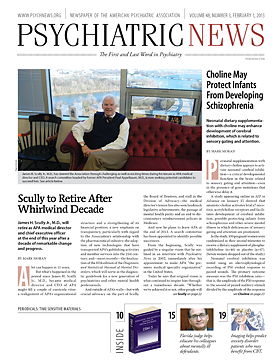As a psychiatrist in a solo private practice, I was probably typical of many of my colleagues by having an assortment of places in which I kept information about my patients. I used Microsoft Outlook for appointments; Word for patient information, progress notes, and prescription tracking; and Excel for patient accounts. My system was certainly not an integrated, fully functional electronic health record (EHR), but it worked for me.
At the end of 2010, I became a participating Medicare provider and began investigating the government’s Meaningful Use program, which provides $44,000 over five years to clinicians who use an EHR in a prescribed manner. In the Exhibit Hall at APA’s 2011 annual meeting, I came across one particular EHR system developed by a company that specializes in software for the mental health field. I liked what I saw and decided to take the plunge. During the next two months, I began setting up my patient records in the EHR. I continued using Outlook for my appointments and decided not to migrate my old progress notes into the EHR. The information I did enter included demographics, insurance, all current and previous medications, diagnoses, and allergies.
As for billing, I started using the system for billing each subsequent session after June 1. In December 2011, I was able to satisfy the Meaningful Use criteria, and I received my first installment incentive payment of $18,000.
The effort to install the EHR was substantial. During May and June, I had to enter all of the above information. On two occasions, I realized that I had set up the medication and billing data incorrectly, primarily because I had not yet developed an in-depth understanding of how the software operated; I had received training on the basics, but as with anything new, it takes time to recognize nuances. As a result, I had to reenter a good deal of this information. As I had continued to use another software program to send the Medicare claims electronically, entering the same information into each system was duplicative.
However, I also began to see the benefits of using the EHR system. It has been great to be able to send prescriptions electronically, and some pharmacies send renewal requests directly to the EHR system. Writing progress notes has always been a real chore for me, but some of the features of the EHR system have made it much easier to do so, and I was able to customize the format of my notes. I used to carry around hard copies of my patient demographic and medication files in case a patient called when I didn’t have my laptop with me. I can now access the same information on my smartphone using a function of the EHR. Last March, I began using the EHR system to submit both Medicare and some commercial insurance claims electronically, which has greatly simplified that process. I have been amazed at how much faster the commercial insurance companies process the claims filed electronically compared with those submitted on paper. Although I am not in-network with any commercial insurers, the faster processing has enabled patients to pay me more quickly.
I have continued to use Outlook for my appointment scheduling, primarily because I am waiting for the EHR vendor to improve that function. At times, I also still use an external drug information/interaction software product, because I like it better than the one utilized by the EHR. Other than that, I am now using the EHR for all of my patient-related tasks.
Although my primary reason for getting an EHR was to take advantage of the government incentive program, I can honestly say that I have benefitted in many more ways. It has greatly simplified my record keeping, prescription management, and billing. Because everything I need is now in one place, it is a lot easier to find patient information, get the phone number of a colleague, or talk to an insurance company, for example. I’m not sure that using an EHR has made me a better psychiatrist, but it has definitely made it easier for me to be the kind of psychiatrist I want to be. ■
Do you have an EHR adoption story to share? Contact me—Steven R. Daviss, M.D.—at
[email protected]. In addition to coordinating this column, I am chair of the APA Committee on Electronic Health Records, an Assembly Representative, Health Standards Committee member at URAC, HIE Policy Board member at the Maryland Health Care Commission, a clinical assistant professor at the University of Maryland, chair of the Department of Psychiatry at Baltimore Washington Medical Center, and coauthor of the book Shrink Rap: Three Psychiatrists Explain Their Work. I tweet at @hitshrink and blog at HIT Shrink.
